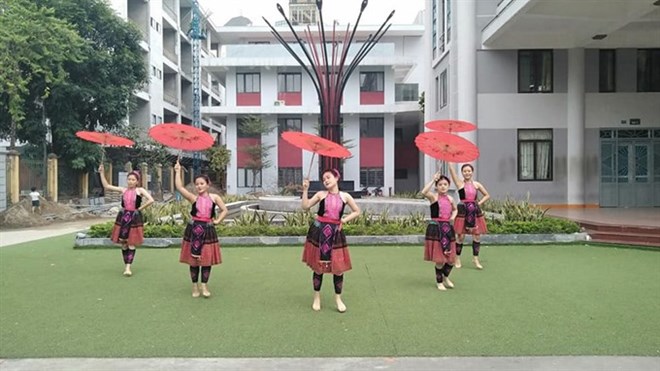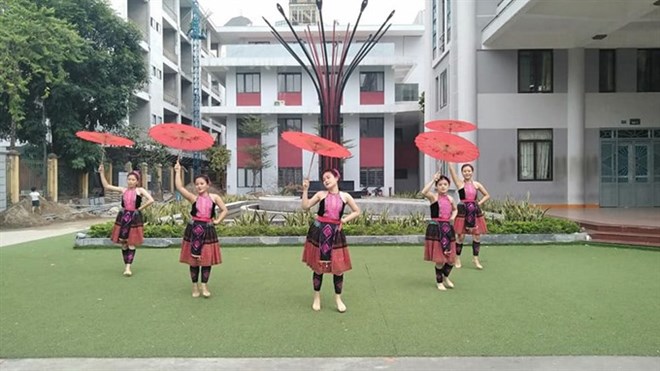
Hanoians will soon get a chance to experience ethnic Mong people’s traditional New Year dances and games.
The programme Xyoo Tshiab Nram Nroog (The Mong’s New Year Celebrated in the City) will take place on January 13 at the Hanoi University of Culture.

Young girls
of the Mong perform their traditional dance during the event. (Photo courtesy
of the organiser)
The annual event has been organised by the Action for Mong Development group
and partners to promote the unique culture of the Mong.
It also provides a chance for Mong people living far from home to enjoy their
traditional celebrations and to preserve their culture, according to Ma A Lau,
member of the organising board.
Various activities will take place including music performances, dancing, game
and a fair where goods and specialties of the Mong will be sold.
Participants will have a chance to try on traditional costumes of the Mong as
well as enjoy delicious food such as banh day (packed sticky rice with meat or
bean fillings wrapped in banana leaves) and men men (steamed minced maize).
A cultural space of the Mong will feature music from pan pipe, bamboo flute and
Jew’s harp.
Unlike the Lunar New Year of the Kinh majority which falls on the first day of
the first lunar month, the New Year’s Eve of the Mong falls on the first day of
the last lunar month. The celebration is to express gratitude to ancestors and
gods.
The Mong is one of the largest ethnic groups in Vietnam. They live mostly in
the mountainous regions in the northern provinces of Ha Giang, Lao Cai, Lai
Chau, Son La, and in the north-central and Central Highlands provinces of Thanh
Hoa, Nghe An, Gia Lai and Kon Tum.
There are various Mong groups, such as white Mong, black Mong and flower Mong.
Though they are different from the costumes and languages, the Mong nationwide
have some common cultural traits, such as their New Year celebration.
Source: VNA
With an increasingly vibrant and widespread emulation movement aimed at building cultured residential areas and cultured families, Yen Thuy District has been making steady progress toward improving both the material and spiritual well-being of its people, while fostering a civilized, prosperous, beautiful, and progressive community.
Once lacking recreational spaces and community facilities, Residential Group 2 in Quynh Lam Ward (Hoa Binh City) has recently received attention for the construction of a new, spacious, and fully equipped cultural house. The project followed the model of state support combined with public contributions in both labor and funding.
The "All people unite to build cultural life" movement, which has been effectively integrated with Kim Boi district’s socio-economic development goals, is fostering a lively spirit of emulation across local residential areas, hamlets, villages, public agencies, and enterprises. In addition, through the initiative, traditional cultural values are being preserved and promoted, while community solidarity and mutual support in poverty reduction and economic development are being strengthened.
A working delegation of the Hoa Binh provincial People’s Committee led by its Permanent Vice Chairman Nguyen Van Toan on June 11 inspected the progress of a project to build the Mo Muong Cultural Heritage Conservation Space linked to tourism services in Hop Phong commune, Cao Phong district.
Born and growing in the heroic land of Muong Dong, Dinh Thi Kieu Dung, a resident in Bo town of Kim Boi district, in her childhood was nurtured by the sweet lullabies of her grandmother and mother. These melodies deeply imprinted on her soul, becoming an inseparable part of her love for her ethnic group's culture. For over 20 years, this love for her hometown has driven Dung to research, collect, and pass down the cultural values of the Muong people to future generations.
In the final days of May, the Ethnic Art Troupe of Hoa Binh Province organized performances to serve the people in remote, mountainous, and particularly disadvantaged areas within the province. These were not just ordinary artistic shows, but they were the meaningful journeys aimed at spreading cultural values, enhancing the spiritual life of the people and contributing to the preservation of ethnic minority cultural identities.



